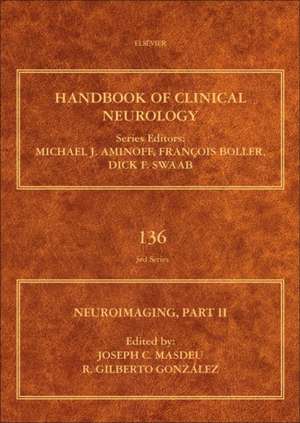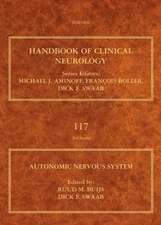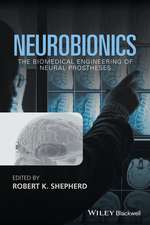Neuroimaging, Part II: Handbook of Clinical Neurology, cartea 136
Joseph C. Masdeu, R. Gilberto Gonzalezen Limba Engleză Hardback – 26 iul 2016
This second volume covers imaging of the adult spine and peripheral nervous system, as well as pediatric neuroimaging. In addition, it provides an overview of the differential diagnosis of the most common imaging findings, such as ring enhancement on MRI, and a review of the indications for imaging in the most frequent neurological syndromes.
The volume concludes with a review of neuroimaging in experimental animals and how it relates to neuropathology. It brings broad coverage of the topic using many color images to illustrate key points. Contributions from leading global experts are collated, providing the broadest view of neuroimaging as it currently stands.
For a number of neurological disorders, imaging is not only critical for diagnosis, but also for monitoring the effect of therapies, with the entire field moving from curing diseases to preventing them. Most of the information contained in this volume reflects the newness of this approach, pointing to the new horizon in the study of neurological disorders.
- Provides a relevant description of the technologies used in neuroimaging, such as computed tomography, magnetic resonance imaging, positron emission tomography, and several others
- Discusses the application of these techniques to the study of brain and spinal cord disease
- Explores the indications for the use of these techniques in various syndromes
Din seria Handbook of Clinical Neurology
- 20%
 Preț: 1274.52 lei
Preț: 1274.52 lei - 20%
 Preț: 1311.43 lei
Preț: 1311.43 lei - 23%
 Preț: 1286.74 lei
Preț: 1286.74 lei - 20%
 Preț: 1344.20 lei
Preț: 1344.20 lei - 20%
 Preț: 1349.51 lei
Preț: 1349.51 lei - 24%
 Preț: 1275.78 lei
Preț: 1275.78 lei - 20%
 Preț: 1344.02 lei
Preț: 1344.02 lei - 20%
 Preț: 1339.70 lei
Preț: 1339.70 lei - 20%
 Preț: 1316.98 lei
Preț: 1316.98 lei - 20%
 Preț: 1315.38 lei
Preț: 1315.38 lei - 20%
 Preț: 1329.13 lei
Preț: 1329.13 lei - 20%
 Preț: 1313.06 lei
Preț: 1313.06 lei - 5%
 Preț: 1309.43 lei
Preț: 1309.43 lei - 5%
 Preț: 1300.74 lei
Preț: 1300.74 lei - 20%
 Preț: 1302.98 lei
Preț: 1302.98 lei - 20%
 Preț: 1304.03 lei
Preț: 1304.03 lei - 20%
 Preț: 1304.66 lei
Preț: 1304.66 lei - 20%
 Preț: 1303.13 lei
Preț: 1303.13 lei - 20%
 Preț: 1319.00 lei
Preț: 1319.00 lei - 20%
 Preț: 1312.90 lei
Preț: 1312.90 lei - 5%
 Preț: 1304.05 lei
Preț: 1304.05 lei - 5%
 Preț: 1305.77 lei
Preț: 1305.77 lei - 20%
 Preț: 1303.05 lei
Preț: 1303.05 lei - 20%
 Preț: 1312.24 lei
Preț: 1312.24 lei - 20%
 Preț: 1304.66 lei
Preț: 1304.66 lei - 20%
 Preț: 1148.33 lei
Preț: 1148.33 lei - 5%
 Preț: 1221.35 lei
Preț: 1221.35 lei - 25%
 Preț: 1256.05 lei
Preț: 1256.05 lei - 5%
 Preț: 1203.24 lei
Preț: 1203.24 lei - 21%
 Preț: 1062.72 lei
Preț: 1062.72 lei - 23%
 Preț: 1126.07 lei
Preț: 1126.07 lei - 19%
 Preț: 1070.63 lei
Preț: 1070.63 lei - 20%
 Preț: 1069.47 lei
Preț: 1069.47 lei - 25%
 Preț: 1178.93 lei
Preț: 1178.93 lei - 5%
 Preț: 1187.28 lei
Preț: 1187.28 lei - 25%
 Preț: 1165.32 lei
Preț: 1165.32 lei - 19%
 Preț: 1180.73 lei
Preț: 1180.73 lei - 25%
 Preț: 1165.86 lei
Preț: 1165.86 lei - 19%
 Preț: 1178.74 lei
Preț: 1178.74 lei - 25%
 Preț: 1175.31 lei
Preț: 1175.31 lei - 5%
 Preț: 1343.67 lei
Preț: 1343.67 lei - 5%
 Preț: 1338.90 lei
Preț: 1338.90 lei - 5%
 Preț: 1175.59 lei
Preț: 1175.59 lei - 5%
 Preț: 1165.40 lei
Preț: 1165.40 lei - 20%
 Preț: 1225.89 lei
Preț: 1225.89 lei - 24%
 Preț: 1165.66 lei
Preț: 1165.66 lei - 25%
 Preț: 1226.82 lei
Preț: 1226.82 lei - 25%
 Preț: 1222.45 lei
Preț: 1222.45 lei
Preț: 1293.17 lei
Preț vechi: 1723.03 lei
-25% Nou
Puncte Express: 1940
Preț estimativ în valută:
247.44€ • 258.35$ • 204.79£
247.44€ • 258.35$ • 204.79£
Carte tipărită la comandă
Livrare economică 29 martie-12 aprilie
Preluare comenzi: 021 569.72.76
Specificații
ISBN-13: 9780444534866
ISBN-10: 0444534865
Pagini: 720
Dimensiuni: 184 x 260 x 22 mm
Greutate: 1.84 kg
Editura: ELSEVIER SCIENCE
Seria Handbook of Clinical Neurology
ISBN-10: 0444534865
Pagini: 720
Dimensiuni: 184 x 260 x 22 mm
Greutate: 1.84 kg
Editura: ELSEVIER SCIENCE
Seria Handbook of Clinical Neurology
Public țintă
Beginners and specialists in neurology, neurosurgery, psychology, biomedical engineering, radiology, and systems neuroscienceCuprins
Section III Spinal Diseases32. Functional anatomy of the spine33. Neuroimaging of spine tumors34. Vascular disease of the spine35. Infection36. Non-infectious inflammatory disorders37. Imaging of trauma of the spine 38. Metabolic and hereditary myelopathies39. Degenerative spine diseaseSection IV Diseases of the Peripheral Nervous System40. Peripheral Nerves41. Muscle: MRI42. Muscle: UltrasoundSection V Neurological Syndromes of the Adult: When and How to Image 43 Sudden Neurological Deficit44.Pituitary imaging45. Visual Impairment46. Vertigo and Hearing Loss47. Progressive Weakness or Numbness of Central or Peripheral Origin48. Gait and balance disorders49. Movement Disorders50. Cognitive or Behavioral Impairment51. Epilepsy52. Myelopathy53. Low Back Pain, RadiculopathySection VI Differential Diagnosis of Imaging Findings54. Structural Imaging of the Brain: MRI, CT55. Vascular Imaging: ultrasound56. Diffusion tensor imaging and functional MRISection VII Pediatric Neuroimaging 57. Normal development58. Congenital anomalies of the brain and spine59. Tumors60. Vascular disease61. Infections62. Trauma63. Metabolic, endocrine and other genetic disorders64. Cerebrospinal fluid circulation disorders65. Indications for the performance of neuroimaging in childrenSection VIII Interventional Neuroimaging66. Endovascular Treatment of Acute Ischemic Stroke67. Endovascular treatment of Intracranial Aneurysms68. Endovascular treatment of vascular malformationsSection IX Neuropathology and Experimental Models69. Postmortem imaging and neuropathologic correlations with imaging
Recenzii
"This creative collection should prove interesting and valuable to a wide range of practitioners and students who wish to increase their knowledge of neuroscience and the broad choice of neuroimaging tools available to study the human nervous system, spine, skull base, and head and neck." --World Neurosurgery
Parts 1 and 2 of this handbook provide a comprehensive collection of concise chapters covering nearly all areas of neuroradiology, written by recognized leaders in the field. Each chapter contains up-to-date information, with well-chosen references for further study. Despite the diversity of topics, the organization is logical, starting with imaging methods and followed by pathology and common indications for brain and spine imaging, as well as pediatric neuroimaging. Chapters on neurointervention and high-resolution postmortem imaging contribute to the distinctive nature of this collection.
Section I focuses on the wide range of neuroimaging techniques, including myelography, an important topic that is often neglected in the age of magnetic resonance imaging (MRI) of spine disorders. These sections provide excellent background for physicians in all fields of neuroscience, as well as useful review for radiologists and radiology trainees. Both technical and practical information is provided. Hot topics, such as dual-energy computed tomography (CT), as well as established techniques like MR perfusion, are described, and useful examples and illustrative images are provided. The section also includes chapters describing nuclear medicine examinations, such as positron emission tomography and single-photon emission CT, which are now an integral part of the workup of neurodegenerative disorders.
The next 3 sections review diseases of the brain, spine, and peripheral nervous system. Magnetic resonance neurography, a relatively new technique, is given excellent coverage. MRI and ultrasound of skeletal muscle are reviewed, a novel addition to a neuroradiology text, given that these are studies typically interpreted by musculoskeletal radiologists.
Sections V and VI are a strength of this text, describing the proper imaging evaluation of common neurologic syndromes and approach to the differential diagnosis of common imaging findings. The authors provide recommendations and clear rationales for choosing the appropriate imaging examination based on patient history and symptoms. In the differential diagnosis chapters, the reader is taught to interpret imaging findings like a radiologist, an exercise that should prove valuable and interesting to all specialists who personally evaluate imaging studies.
Section VII provides an overview of the most common pediatric pathologies. Three chapters are dedicated to cerebral vascular intervention, covering the primary indications for these techniques: endovascular treatment of stroke, aneurysm, and arteriovenous malformations. Treatment options and succinct summaries of clinical trials are valuable additions. The final chapter is unique, detailing the role of postmortem imaging in validating MRI properties with direct histopathological correlation.
This creative collection should prove interesting and valuable to a wide range of practitioners and students who wish to increase their knowledge of neuroscience and the broad choice of neuroimaging tools available to study the human nervous system, spine, skull base, and head and neck.
~ Wende N. Gibbs, MD, MS, Department of Radiology, University of Southern California, Los Angeles, California, USA
Parts 1 and 2 of this handbook provide a comprehensive collection of concise chapters covering nearly all areas of neuroradiology, written by recognized leaders in the field. Each chapter contains up-to-date information, with well-chosen references for further study. Despite the diversity of topics, the organization is logical, starting with imaging methods and followed by pathology and common indications for brain and spine imaging, as well as pediatric neuroimaging. Chapters on neurointervention and high-resolution postmortem imaging contribute to the distinctive nature of this collection.
Section I focuses on the wide range of neuroimaging techniques, including myelography, an important topic that is often neglected in the age of magnetic resonance imaging (MRI) of spine disorders. These sections provide excellent background for physicians in all fields of neuroscience, as well as useful review for radiologists and radiology trainees. Both technical and practical information is provided. Hot topics, such as dual-energy computed tomography (CT), as well as established techniques like MR perfusion, are described, and useful examples and illustrative images are provided. The section also includes chapters describing nuclear medicine examinations, such as positron emission tomography and single-photon emission CT, which are now an integral part of the workup of neurodegenerative disorders.
The next 3 sections review diseases of the brain, spine, and peripheral nervous system. Magnetic resonance neurography, a relatively new technique, is given excellent coverage. MRI and ultrasound of skeletal muscle are reviewed, a novel addition to a neuroradiology text, given that these are studies typically interpreted by musculoskeletal radiologists.
Sections V and VI are a strength of this text, describing the proper imaging evaluation of common neurologic syndromes and approach to the differential diagnosis of common imaging findings. The authors provide recommendations and clear rationales for choosing the appropriate imaging examination based on patient history and symptoms. In the differential diagnosis chapters, the reader is taught to interpret imaging findings like a radiologist, an exercise that should prove valuable and interesting to all specialists who personally evaluate imaging studies.
Section VII provides an overview of the most common pediatric pathologies. Three chapters are dedicated to cerebral vascular intervention, covering the primary indications for these techniques: endovascular treatment of stroke, aneurysm, and arteriovenous malformations. Treatment options and succinct summaries of clinical trials are valuable additions. The final chapter is unique, detailing the role of postmortem imaging in validating MRI properties with direct histopathological correlation.
This creative collection should prove interesting and valuable to a wide range of practitioners and students who wish to increase their knowledge of neuroscience and the broad choice of neuroimaging tools available to study the human nervous system, spine, skull base, and head and neck.
~ Wende N. Gibbs, MD, MS, Department of Radiology, University of Southern California, Los Angeles, California, USA










